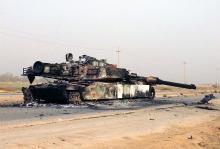kathy kelly

In early April, the U.S. Navy unveiled its Mach 7 Magnetic Mangler, “a railgun straight out of Star Trek that can take out targets at 100 miles with a projectile flying at nearly 7,000 feet per second.” So far, the U.S. military has spent $240 million developing the railgun over a period of 10 years. CBS News reports that the railgun won’t go to sea until 2016, but one article, published in The Gazette, suggests that the U.S. military may have decided to show off the Magnetic Mangler in order to send a message to the Russian government.
In advance of the University of Wisconsin's recent “Resources for Peace” conference, a professor friend asked participants to consider whether the increasing competition for depleted global resources, for goods to meet essential human needs, would tend inevitably to make people less humane. She was thinking particularly about what she termed “the shrinking humanism” seen in dystopian novels and films that portray cruelty and violence among people who fear for their survival.
THE FONDEST memories I have of Kathy Kelly are of her singing. It’s safe to say that her three nominations for the Nobel Peace Prize were not for her voice, which is sometimes sweet but often a touch out of key. At times I’ve imagined her feeling briefly self-conscious about this, but that passes. The song remains, and I am again reminded of just how deeply this woman can move me.
In spring 1999, in a small banquet room at Georgetown University, I first heard Kelly sing and speak about the suffering in Iraq. A crowd of about 200 people had gathered to hear about her work. She had been to Iraq dozens of times to put a human face on the conflict there and to defy the drastic financial and trade embargo that the U.N. Security Council had imposed shortly after Iraq’s 1990 invasion of Kuwait.
She briefly went over the statistics—the deep poverty, the lack of medicines, the estimated half-million children who had died, many due to the U.N. sanctions, enforced in part by a U.S.-led blockade—but she quickly moved on. Statistics weren’t her strength.
Instead she spoke from the heart. Kelly talked about the ordinary Iraqis she had met: the worn women who served her tea and biscuits they could barely afford, the countless kids in threadbare hand-me-downs who ran after her merrily in the street, the tired doctors who broke down crying as they remembered all the children they had lost, the stone-faced parents who accepted her condolences because they didn’t know what else to do.
She also told the story of Zayna, a 7-month-old baby girl who died of malnutrition shortly after Kelly visited her in the hospital.